Agencia Estatal Consejo Superior
De Investigaciones Científicas
Calle Serrano 117
28006 Madrid
Spain
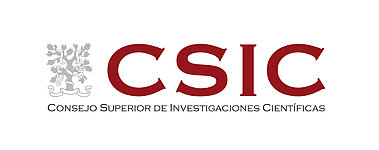
Agencia Estatal Consejo Superior
De Investigaciones Científicas
Calle Serrano 117
28006 Madrid
Spain
The CSIC has more than 10 000 employees, including nearly 4 000 staff researchers. Currently, it has 120 institutes spread across the country, of which 67 are fully-owned institutes, and 53 are Joint Research Units in partnership with other Spanish universities or research institutions. The CSIC has a Vice-presidency of International Affairs dedicated to the planning and promotion of international relations, including the participation in international and European programmes, especially the Framework Programme of Research and Innovation of the EU. It also has a delegation in Brussels that holds the institutional representation of the CSIC before the institutions of the EU and other relevant organisations and forums and fosters and potentiates relationships with the representatives of international research organisations similar to the CSIC.
The CSIC produces 20% of the national scientific output (over 10 000 publications in high impact international journals in 2017) and remains the first institution in Spain in the generation of patents, with around 200 patent applications in 2017. The Vice-presidency for Technology Transfer assists the CSIC's researchers with patent evaluation and application processes, commercialisation of the CSIC's technology offer and with the creation of start-ups.
The CSIC is a major player in the development of the European Research Area (ERA) and therefore a significant contributor to the European integration process. As of May 2019, the CSIC has obtained 575 projects in H2020, with a total EU financial contribution of 239 million euros and is listed the 1st organisation in Spain and the 4th participant by number of projects (E-CORDA).
The CSIC is a main actor in the ERC programme, with a total of 93 projects signed as Host Institution in all areas of knowledge and is also an active member in the European Institute for Innovation and Technology's (EIT) Knowledge and Innovation Communities (KICs), currently participating in the EIT Raw Materials and EIT Food as core partner. As for European and International Programmes other than H2020, the CSIC has achieved 26 LIFE (2014 – 2020) grants, 38 INTERREG V projects, mainly SUDOE, POCTEP, POCTEFA, MED, ATLANTIC or MAC. Additionally, the CSIC has obtained 30 contracts resulting from call for tenders published by EU institutions, agencies and other bodies (e.g. ESA, EASME, JRC etc.) with a total EU financial contribution of 1,5 million euros.
The Margarita Salas Center for Biological Research (CIB Margarita Salas) is a publicly funded national research institute that belongs to the Spanish National Research Council (CSIC). The CIB's Department of Microbial and Plant Biotechnology is devoted to advance the understanding on how living organisms, plants, animals and microorganisms, interact and respond to their environment. Organisms are studied on every scale, from the molecular to whole-body level, and using multidisciplinary experimental approaches. The diversity of the permanent research staff, which operates in 13 groups, combined with modern equipped labs, provide for variety and excellence in both, fundamental and applied research. The significance of research developed in CIB is reflected in highly-cited publications in leading journals, as well as in collaborations with other scientists from top institutes all over the world. In this scenario, the Department provides a unique entourage for graduate students to perform their PhD thesis. The commitment of the Department is to develop national and international leadership in integrated environmental studies and to maintain a stimulating, competitive ambience for talented young scientists. The CIB is part of the Campus of International Excellence Moncloa (www.campusmoncloa.es/en). As a consequence, the CIB has extensive human and material resources for the execution of this project. The Polymer Biotechnology group is part of the Microbial and Plant Biotechnology Department of the CIB and aims to explore and exploit the bacterial abilities for producing and degrading plastics to contribute to planet sustainability. One of its PIs (Prof. Prieto) participates in MIX-UP as Primary Participant Contact.
The National Centre for Biotechnology (CNB) of the CSIC has become the most important and best-endowed public facility for Life Sciences Research in the country. The centre is located within the campus of the Autonomous University of Madrid (UAM), that harbours the single most crucial constellation of scientists in Spain, and as a consequence, the centre has extensive human and material resources for the execution of this proposal. The CNB maintains very productive programs in Microbial Biotechnology, Plant Molecular Biology and Molecular and Cellular Biology. The centre has extensive scientific, human and material resources for the development of this proposal. The Department of Systems and Synthetic Biology holds eight independent teams concerned with various aspects of network biology, environmental microbiology, metagenomics gene expression regulation, and protein structure. The involved laboratories have made acknowledged fundamental and technical contributions directly applicable to the development of MIX-UP, specifically on metabolic models and development of standard genetic tools for analysing and constructing complex phenotypes in bacteria.
The main tasks of CIB in MIX-UP project are engineering PHA polyester hydrolases (subtask 2.3.2), optimisation of PHA production in P. putida (task 5) and generation of added value materials derived from mcl-PHA (task 6.5).
The main tasks of CNB in MIX-UP project are related to i) the engineering of hyper performing variants of P. putida (task 4.3) and engineering catalytic bacterial hives
(task 7.4), ii) the model-guided and synthetic community-based consolidated processes (task 5.2), engineering distributed catalysis using P. putida consortia (task 5.8) and the development of molecular glues for assembly consortia (task 7.8), and iii) the implementation of synbio tools (task 7.7) and computational genome-scale models (task 7.6).

Spanish National Research Council
Margarita Salas Center for Biological Research
Research Professor, Head of Division Polymer Biotechnology
M. Auxiliadora Prieto is a Research Professor at CSIC and is the coordinator of SusPlast platform, an interdisciplinary technology platform for sustainable plastic of CSIC (www.susplast-csic.org). She leads the Polymer Biotechnology group as part of the Microbial and Plant Biotechnology Department of the Biological Research Centre Margarita Salas (CIB-CSIC). Her group has developed many techniques to approach basic and industrial problems in the fields of bio-plastics, bio-materials and bio-production. She has huge experience in microbial metabolism for the molecular characterisation of pathways related to bio-synthesis and bio-degradation of bio-products. The significance of the research developed in Prieto's group is reflected in highly-cited publications in leading journals, as well as in collaborations with other scientists from top institutes all over the world. Prof. Prieto has participated in, led and coordinated national (14) and international projects (9), devoting her effort to the production of bio-polymers in microorganisms, addressing this subject from different approaches to cover both basic and applied aspects. The sub-team directly involved in this Project includes Dr Manuel Santiago Godoy (Postdoc, Metabolic engineering).

Spanish National Research Council
Margarita Salas Center for Biological Research
Postdoc
Manuel Santiago Godoy obtained his bachelor in Biological Sciences at the University of Buenos Aires (Argentina) in the year 2008. He became interested in microbiology and production of biopolymers as an alternative to petrochemical plastics. In the year 2014, he finished his PhD related to Escherichia coli global regulator CreC for the production of succinate and polyhydroxybutyrate. He did his first postdoctoral stay in the laboratory of "Genetics and Physiology of Bacteria of Biotechnological Interest" in the IQUIBICEN-CONICET. In the year 2016 he moved to Madrid to join Polymer Biotechnology laboratory led by Auxi Prieto. His work focused on the non-sulphur purple bacteria Rhodospirillum rubrum to study its physiology under moderate high pressures of CO. Currently, he is working for MIX-UP project, engineering Pseudomonas putida as a chassis for PHA depolymerases production and plastic waste upcycling.

Spanish National Research Council
Margarita Salas Center for Biological Research
EU project management
Sonia Méntrida received a Master's degree in Botany at the Vienna University where she also gained considerable expertise in microbiology while participating in projects related to the use of microorganisms (mainly filamentous fungi) and their enzymes to obtain fuels and chemicals. In 2017 she joined the Microbial & Plant Biotechnology department at the Biological Research Center (CIB) and worked in the production of healthy biocompounds from microalgae. From 2019 until December of 2020 she supported the management of research projects funded by national institutions and the European Union at the Polymer Biotechnology group.
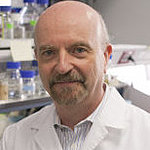
Spanish National Research Council
National Centre for Biotechnology
Project Leader, Professor of Research
Victor de Lorenzo's research focuses on the molecular biology and genetic engineering of microorganisms for environmental remediation and industrial biotransformations. He belongs to the editorial boards of five international scientific journals of microbiology and microbial ecology. He is a member of the European Molecular Biology Organisation and the American and European Academies of Microbiology. His CNB team includes ten co-workers (1 PIs, 3 technicians, 1 Assistant, 3 Postdocs and 2 Graduate students). The sub-team directly involved in this Project includes Dr Tomas Aparicio (Postdoc, DNA assembly), Dr Esteban Martínez (Postdoc, Systems Microbiology) and Sofía Fraile (technician, general experimental support).
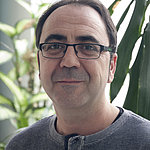
Spanish National Research Council
National Centre for Biotechnology
Project Leader, Staff Scientist, Head of Systems Biotechnology Group
Dr Juan Nogales is the head of System Biotechnology Group at Centro Nacional de Biotecnología-CSIC in Madrid (Spain). His current research spans multidisciplinary approaches, including Systems and Synthetic Biology, whose common goal is the full understanding of microbial living systems, from molecular characterisation of their fundamental components (e.g., gene, proteins, metabolites) and their interrelationships, to systems properties (e.g., phenotype, metabolic robustness/versatility). He possesses a broad experience in metabolic reconstructions and metabolic engineering. Moving forward from cells to microbial communities, his group is developing new protocols for synthetic microbial ecosystems design and engineering. Currently, he is Principal Investigator (PI) in several projects, including three H2020 research projects being the main coordinator of SynBio4Flav, a cutting-edge endeavour pursuing the standardised and cost-effective biotechnological production of functionalized flavonoids in the context of synthetic microbial consortia. Besides, he is part of CSIC IBISBA core and funder member of SusPlast Platform, an interdisciplinary platform for sustainable plastic towards a circular economy. Finally, he is a co-founder of Darwin Bioprospecting Excellence, a startup focused on microbial bioprospection and metagenomics analysis. He has participated in 13 national and EU projects in the last ten years, six as PI.
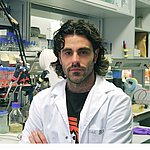
Spanish National Research Council
National Centre for Biotechnology
Postdoc
Dr Martinez obtained his PhD in Biology at UCM in 2001, where he studied the bacterial physiology of stationary phase under the supervision of Antonio Tormo and Juana María Navarro. Then, he stayed as a postdoc in the laboratory of Julián Perera (UCM) working on bacterial biodegradation until the end of 2002. Next, he moved to the USA for a postdoctoral position. First, he worked on comparative genomics of Pseudomonas aeruginosa in Roberto Kolter’s laboratory at the Harvard Medical School for three years. Then, he moved to Kevin Foster’s lab at Harvard University where he worked on social interactions of P. aeruginosa. After that period, he returned to Spain and started working in Víctor de Lorenzo’s laboratory at CNB in 2008 where he focused on different aspects related to environmental microbiology and synthetic biology.
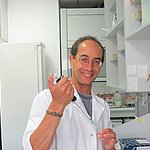
Spanish National Research Council
National Centre for Biotechnology
Postdoc
Dr Aparicio got a PhD in Biology from the UCM University (Madrid, 2000), where he studied the biology of a Thiobacillus plasmid. After that his professional track included experience in a biotech company (PharmaMar S.A.-Madrid, 2001-2004), technical work in the Unit of Genomics of Scientific Park of Madrid (PCM, 2004-2009), a post-doc period at the CBMSO working with yeast (Madrid, 2010) and also teaching activities as Associate Professor at UCM and UFV universities (Madrid). Although involved in different research fields along his career, he has mainly focused on Microbiology and Bacterial Genetic Engineering.
In Víctor de Lorenzo’s laboratory (CNB-Madrid, 2013-), he has a post-doc position and is focused on P. putida KT2440 strain engineering and pSEVA platform development. In this context he collaborates in a number of specific projects such as recombineering and CRISPR/Cas9 assisted GE, Yeast Assembly, construction of a variety of shuttle vectors (Gram+, yeast, streptomyces) and development of new expression systems.
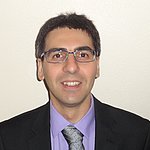
National Centre for Biotechnology
Spanish National Research Council
Postdoctoral Researcher
Blas Blázquez is a Postdoctoral Researcher at the National Center for Biotechnology CSIC in Madrid (Spain). He got his PhD in Biochemistry and Molecular Biology by studying the catabolism of aromatic compounds in nature by facultative anaerobic microorganism. He moved to University of Notre Dame (USA) to perform a multidisciplinary work in biomedical sciences studying the regulation of mechanisms of resistance to antibiotics in bacteria and the recycling of the bacterial cell wall. Currently, he is in the Systems Biotechnology Group on Nogales´s Lab dedicated to the study of the metabolic robustness of microorganism and its applications in biocatalysis processes. He is participating in the European projects LiAr and SynBio4Flav by working on metabolic and synthetic engineering of microbial communities for the production of compounds of interest like recombinant proteins or flavonoids.

Erika Gonzalez Alvarez received her bachelor in Biological Science at the Universidad Autónoma de Nuevo León, Monterrey (México) in the year 2008. From her bachelor, she was interested in nanobiotechnology, specifically in the development of plasticizing strategies for bioactive compounds such as drugs, protein and microorganisms using synthetic and natural polymers. Her PhD, obtained in 2014, addressed the polymeric encapsulation of Bacillus thuringiensis for its use as a bioinsecticide. During her first postdoctoral stay in Madrid at Polymer Biotechnology laboratory led by Auxi Prieto, she developed polyhydroxyalkanoate-based strategies for bioplastisizing P. putida towards biotechnological applications. Currently, she works at SBG group in the context of MIX-UP project designing spatially-segregated P. putida synthetic consortia devoted to waste plastic revalorization.

Spanish National Research Council
PhD student
Francisco Blanco obtained his Bachelor degree in Biotechnology at the Technical University of Madrid (UPM) in the year 2017. He then obtained a Master’s degree in Industrial Biotechnology at the Complutense University of Madrid (UCM) in 2019, where he obtained the Master’s Extraordinary award. During this period, he obtained a shot term stay grant to pursue his research in Bacterial cellulose production a Dr Kuan Chen Cheng Lab at the Food Science Institute from the National Taiwan University (NTU). Since 2019, he is recipient of a predoctoral grant from the Spanish Ministry of Science and Innovation to develop his PhD in bacterial biopolymer production and functionalization, under the direction of Prof. Auxi Prieto in the Polymer Biotechnology Lab, at the Biological Research Center Margarita Salas (CIB-CSIC). He is currently involved in the MIX-UP project, working on the functionalization of bacterial biopolymers with antimicrobial purposes.